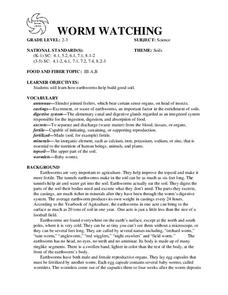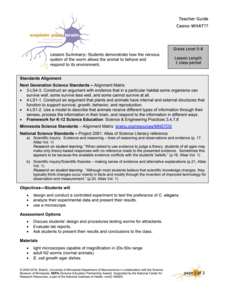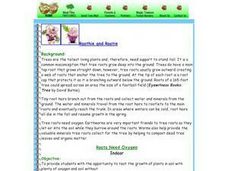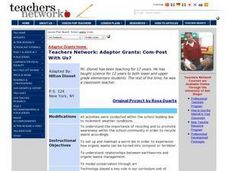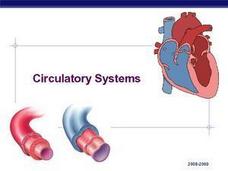Curated OER
Alternative Animal Agriculture
Presenting an unusual topic, this collection of slides examines alternative animals that can be grown for profit or human use. It details the raising of rabbits as food, llamas for textiles, earthworms as fish bait, and a variety of...
University of Minnesota
Sheep Brain Dissection
Bored with frog and earthworm dissections? Had your fill of fetal pigs? Anatomy students will be intrigued by the sheep's brain, and you will be prepared with guiding questions, extension activities, and pictures as they dissect one —...
Museum of Science
Terrarium
Make a premium terrarium. Learners create a miniature terrarium to study ecosystems. They use a clear container, along with rocks, soil, moss, leaves, woodland plants, earthworms, and bugs to construct their terrariums.
Curated OER
Digital Dissections
Young scholars dissect organisms and take photographs to create a PowerPoint dissection library. In this anatomy lesson, students dissect organisms that interest them and photograph the process while identifying structures. They create a...
Curated OER
WORM WATCHING
Students investigate how earthworms help build good soil. They examine the worms carefully to find the ringlike segments and swollen band at the front of the earthworm's body. Students take turns dampening the soil every day and adding...
NOAA
What's New?
Biodiversity in some areas is more diverse than one might think. Using a two-day lesson, pupils consider the biodiversity of the Hudson Canyon and the characteristics of one organism. They begin with an analysis of the common earthworm...
Curated OER
Organic and Inorganic Recycling
Students examine their role in polluting the environment and discuss the importance of recycling. In groups, they place earthworms into compost piles to observe why they are considered natural recyclers. They also practice sorting a...
University of Minnesota
Caeno-WHAT??
Can you feel that? Can you smell that? Since pupils can't ask worms about their sense of smell and touch, they design and complete an experiment to answer these questions. Individuals expose nematodes to different stimuli using their...
Museum of Science
Worm Farm
It is not a barrel of monkeys—it's a jar of worms! Scholars create a worm farm in a spaghetti sauce jar. Pupils layer moist soil, sand, and oatmeal to create a habitat for worms. Individuals place worms into the habitat, cover it with...
Curated OER
"The Soil Around Us" Project
Students look at Web sites containing information about soil and related subjects such as earthworms. They use Web site review sheets to focus their review of the content on the sites and to introduce evaluation concepts for the design...
Curated OER
Earthworm Movement and Landscape Structure
Students describe differences in animal usage of habitats depending upon successional status of site. They also design other experiments to test movement patterns of animals through habitats of differing structure.
Curated OER
Science: Where the Worms Live
Students build mine-earthworm habitats to discover their niche in them. They make predictions about what the niche looks like in a week and draw a picture of it. Students notice the tunnels in the soil and how the sand and dirt are now...
Curated OER
More Bait for Your Buck!
Students determine where to buy the heaviest earthworms as they study invertebrates. They create a double bar graph of the results of the weight data.
Curated OER
Big Fat, Juicy Worms
Students collect and study information about worms. They discover how an earthworm helps process and loosen the soil. They write in their journals as well.
Curated OER
Respiratory System: Breathing
In this respiratory system: breathing activity, students read through the given notes. Students then compare the different respiratory systems with that of an earthworm, fish, insect, and frog.
Curated OER
Roots Need Oxygen
Students investigate the growth of plants in soil with oxygen and soil without oxygen. They discuss what roots need to survive, and chart the growth of two plants to analyze the difference between plain soil and soil with two earthworms.
Curated OER
Com-Post With Us?
Learners discuss the importance of reducing, recycling and reusing materials to help the environment. As a class, they create a worm bin and observe how it turns material in to compost. They use the internet to research the...
Curated OER
Variation
In this animal habitat worksheet, students read the clues about the animal environments. Students then write or draw each of the animals in the right space. Students find the habitats for trout, a bird, a human, and an earthworm.
Captain Planet Foundation
Shape Shifters in the Math Garden
Combines mathematical measurement with gardening skills. Third graders hunt for worms in the garden and try to find the longest one. They also measure and weigh vegetables that they harvest from the garden, measure rainfall amounts, and...
Curated OER
Circulatory Systems
Excellent diagrams, labels and summaries make this resource be valuable to your students throughout the topic of circulation. All types of circulation vessels are explained, their structure and function is detailed, and the overall...
Curated OER
Circulatory Systems
A slideshow that covers the all-important details related to basic human circulation. The reasoning for exchange of material methods is presented and then labeled diagrams of the main human transfer systems are shown, along with...
MOST
What Are Cells?
What's in a cell, anyway? Kids read informational text on what makes up both animal and plant cells, including a page of vocabulary terms they will need to be familiar with (cytoplasm, ribosomes, vacuoles, etc.). Full-color images make...
North Clackamas Schools
Sorting Living and Nonliving Objects
Is a rock living? How about lima beans? You'll find everything you need for an interactive sorting activity exploring living and non-living things.
National Wildlife Federation
Habitat Web
Young scientists weave together an understanding of ecosystems with this fun collaborative activity. Taking on the roles of different living and non-living elements of specific habitats, learners use a ball of yarn to create the web of...
Other popular searches
- Earthworm Dissection
- Earthworm Anatomy
- Earthworm Activities
- Earthworm Answers
- Earthworm Parts
- Earthworm Habitat
- Earthworm Life Cycle
- Nitrogen Cycle Earthworms
- All About Earthworms
- Earthworm Heart Rate
- Earthworms and Soil
- Earthworms Experiment






